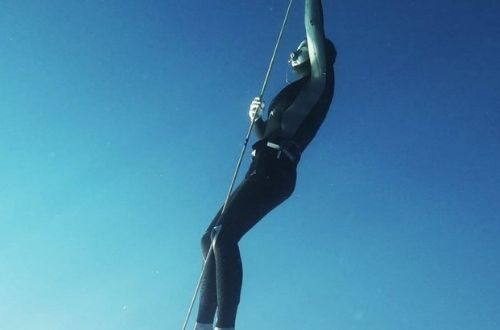When we have a period dedicated to progression, time can go by quite quickly, and it is crucial to have a training plan in mind to structure our training. A plan can take several forms, but whatever the type of plan you put in place, it must consist of “a strategy designed to increase your confidence level until it is high enough to achieve your goal.”
A plan will also allow you to better plan your sessions and better organize yourself in a general way: necessary depth, duration of the session, number of safety divers… A plan must be built individually according to your past performances and results and your ambitions.
However, this plan does not have to be followed by the letter. I would say even more: You MUST NOT follow it!
Why not? The answer is simple: a plan is built based on the analysis and processing of the information you have at a given moment. Now, as you train, you store up new pieces of information. Maybe a dive that you had imagined to be difficult was very easy (or the opposite). Maybe you take longer than you thought to find your good sensations. Maybe you underestimated the fatigue of the trip to get to your freediving destination. Maybe the water is colder than expected, and you cannot stay as long as you originally wanted. There is a lot of new information that comes in once you get things started, and it would be foolish not to take these new pieces of information into account. This way, you can update your plan to get the most out of your training. Remember this keyword, a plan is a “STRATEGY” and the very quality of a good strategist is to be able to objectively re-evaluate a situation along the way and make the necessary adjustments. I often see divers arriving at Dahab with a precise plan (sometimes with specific depths determined to the day) and being too closed “by principle” to the idea of deviating from this plan. It should be the opposite: as a matter of principle, you should constantly try to evaluate whether you should deviate from your plan or not! Of course, sometimes you won’t have to do it, and that’s “good,” but this observation should be made only after re-evaluating the plan!
I will end with an analogy that will speak to everyone.
If you want to get from point A to point B by car:
-A first option is to have a rough idea of the direction, drive in that direction and try to bank on the directional signs and eventually stop to ask for directions (=no plan)
-A second option is to decide on a route in advance and follow that route (=a plan that you do not try to change)
-Finally, the last option consists of using a GPS like “google map,” which will calculate an initial route (=create a plan), but this route will be recalculated permanently according to the traffic or various unforeseen events (=update the initial plan)
I hope we all agree that the 3rd option is the most efficient!
Of course, the difficulty in returning to our freediving training lies in the processing and analyzing the information used in creating and updating the plan, the strategy. Someone with experience and hindsight, who has already seen many divers or understands freediving training, will be much better able to create and update an efficient strategy than someone who only uses information from his own experience. In this sense, don’t hesitate to get help from a coach/instructor or at very least from a friend more experienced than you. They will relieve you of this questioning, of this work. This way, you will keep your energy and attention for what ultimately matters most: your dives, the execution of the plan.

